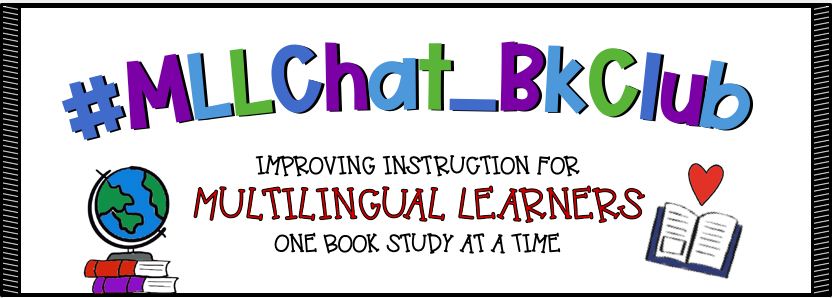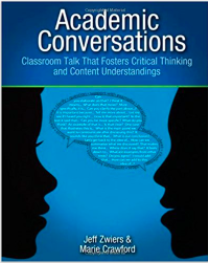This week our chapter in Unlocking English Learners' Potential focuses on academic conversations. This is a great chapter to read in order to focus on strategies to foster high expectations for ELLs that also take into account the affective filter. We learn strategies that emphasize language production that also support students by structuring discussions in ways that make ELLs feel comfortable and by providing them opportunities to practice before sharing with classmates. Pairing what we know (and learned from chapter 3) about scaffolding with this information about academic conversations provides some big impact moves to support our English learners!
Here is a link to Questions for Weeks 4 & 5
Here is a link to Questions for Weeks 4 & 5
As teachers, one of the reading comprehension skills we teach our students is how to make book to book connections. I often do this when I read, so I'd like to offer some complementary resources that go along with this week's chapter.
Academic Conversations is a great text by Jeff Zwiers & Marie Crawford. In addition to LOTS of great information, the authors present a series of talk moves in an effort to promote authentic interactions where students need to listen to one another in order to have a conversation and further their learning through critical thinking. We read this book in Round 4 of #EllChat_BkClub.
I am super excited for the companion version The K-3 Guide to Academic Conversations that is being released in early December. I already have my copy pre-ordered!
Our very own #EllChat_BkClub Eduhero Carlota Holder created a great printable set of academic conversation cards containing visuals, question prompts and sentence frames for each of the talk moves included in Academic Conversations. And because she is such a rockstar, she offers them FREE through her TPT page! Thank you, Carlota!
Michelle Gill also posted this fantastic visual comparing output to interaction. I love this visual so much as it represents the exact shift I need to make with some of my students. Thanks for posting this, Michelle!
Yes, it is important to get students talking.
More student talk. Less teacher talk.
But, the quality of the talk is also important to take into consideration in order to ensure that we are also fostering listening skills. Jeff Zwiers often mentions the concept of an "information gap," which means conversations take place in which students need to rely on one another to complete a task, answer a question, or respond. Students cannot simply regurgitate, copy, or produce language, they need to engage in thinking as part of the process.
If you search TPT, Pinterest, or Google for "accountable talk" or "talk moves," you will also find tons of examples of great sentence frames, sentence stems, and anchor charts that can provide students with excellent language models.
This feels like a really busy time of year and I know many of us are struggling to keep up with the reading. I want to take this opportunity to say, don't worry! There aren't any #EllChat_BkClub police that will come knocking on your door asking why you haven't tweeted responses to the weekly questions. Go at a comfortable pace and the resources will still be here beyond the official dates of the chat.





